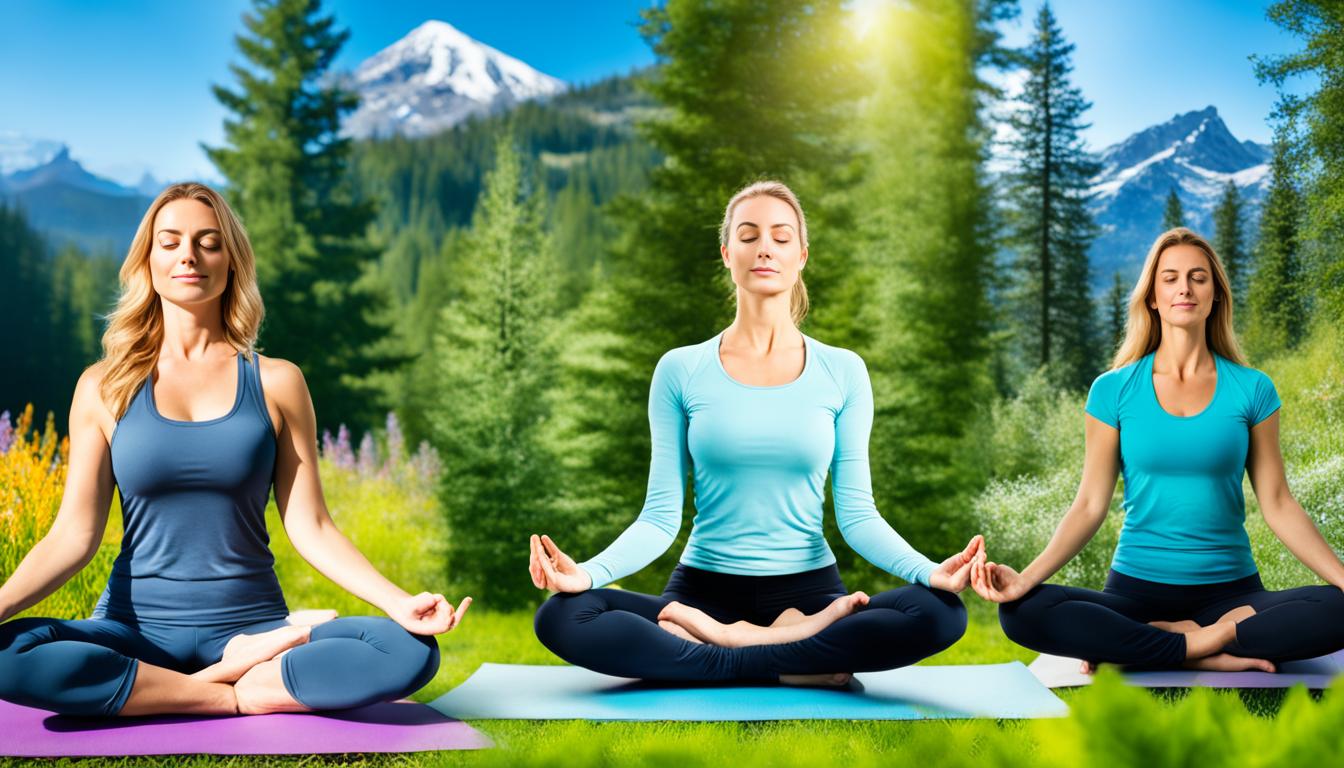Yoga and meditation are two ancient practices that have gained tremendous popularity in recent years. Whether you’re a beginner or have some experience, both yoga and meditation offer a multitude of benefits for your physical and mental well-being. But what sets them apart and which one is right for you? Let’s dive into the world of yoga and meditation to find out.
Yoga originated in northern India over 5000 years ago and combines physical postures, breathing exercises, and meditation. It is a holistic practice that focuses on aligning the mind, body, and spirit. On the other hand, meditation is an internal process that aims to achieve heightened mindfulness and deep self-awareness. Both practices can improve your mental clarity, cardiovascular health, and even bring about positive changes in your brain.
Key Takeaways:
- Yoga and meditation have been practiced for thousands of years and offer numerous benefits for your overall well-being.
- Yoga combines physical postures, breathing exercises, and meditation, while meditation focuses on achieving mindfulness and self-awareness.
- Both practices improve mental clarity, cardiovascular health, and bring about positive changes in the brain.
- Yoga can help with physical issues like hypertension, anxiety, and sleep problems, while meditation can calm chronic mental health issues, such as anxiety and depression.
- The choice between yoga and meditation depends on personal goals and preferences, and it’s also possible to incorporate both practices into your routine.
The Benefits of Yoga and Meditation
Yoga and meditation offer a multitude of benefits for your overall well-being. Through the physical practice of yoga, which includes yoga poses (asanas) and controlled breathing (pranayama), you can address physical issues like hypertension, sleep problems, and anxiety. These yoga practices can also help strengthen your immune system and promote a sense of well-being.
Additionally, mindfulness meditation, a specific form of meditation that focuses on the present moment, can be immensely helpful in calming chronic mental health issues such as anxiety and depression. Both yoga and meditation are effective tools for stress reduction, which is crucial given the potential health risks associated with prolonged stress such as high blood pressure, heart disease, and diabetes.
Overall, a regular practice of yoga and meditation can have a significant positive impact on your mental and physical health. By incorporating these practices into your daily routine, you can experience increased mental clarity, improved cardiovascular health, and a greater sense of well-being. So why not give yourself the gift of yoga and meditation? You deserve to reap the numerous benefits they have to offer.

“The practice of yoga and meditation provides an opportunity to reconnect with ourselves, find inner peace, and cultivate a healthier mind, body, and spirit.”
The Difference Between Yoga and Meditation
Although yoga and meditation share some similarities, they are distinct practices that offer unique benefits. Understanding the difference between the two can help you choose the practice that aligns with your needs and goals.
Yoga involves physical movements and poses, known as asanas. It combines physical exercise, controlled breathing, and meditation. Yoga can be practiced individually or in a group setting, such as a yoga class. It engages all the senses, requiring focus, balance, and coordination. Yoga poses can vary depending on the style of yoga, allowing for a wide range of movements and postures suitable for beginners and advanced practitioners alike.
On the other hand, meditation is a mental practice that involves focusing the mind and achieving a state of deep awareness and mindfulness. It is an internal process that requires silence, stillness, and solitude. During meditation, practitioners typically close their eyes and focus on their breath or a specific object or mantra. The purpose is to calm the mind, observe thoughts without judgment, and cultivate a sense of inner peace and clarity.
The Types of Meditation
There are several types of meditation, each with its own techniques and approaches. Mindfulness meditation, one of the most popular forms, involves paying attention to the present moment and non-judgmentally observing thoughts, feelings, and sensations. Loving-kindness meditation focuses on developing feelings of compassion, empathy, and love towards oneself and others. Transcendental meditation uses a specific mantra to achieve a state of deep relaxation and mental clarity. These are just a few examples of the many meditation techniques available, each designed to cultivate different qualities of mind and overall well-being.
So, while yoga incorporates physical movements and engages the senses, meditation is a practice of mental focus and internal exploration. Both practices have numerous benefits for mental and physical health, and they can be complementary to each other.

Yoga vs Meditation: Which is Better for Me?
Both yoga and meditation offer unique benefits that can be tailored to your individual preferences and needs. Yoga, a physical practice, focuses on strengthening muscles, improving balance, and enhancing overall flexibility. It also provides the opportunity to connect with others and create a sense of community. On the other hand, meditation is a practice that aims to quiet the mind, develop mental clarity, and reduce stress. It allows you to focus inward and find relaxation.
The choice between yoga and meditation depends on your personal goals and preferences. If you enjoy physical activity and want to build strength and flexibility, yoga may be the best choice for you. It offers various poses and sequences that can challenge your body and improve your physical well-being. Additionally, practicing yoga in a group setting can provide a social connection and a supportive environment.
However, if you find yourself seeking mental clarity, stress relief, and inner peace, meditation may be more suitable. The practice of meditation involves focusing on your breath, observing your thoughts, and learning to be present in the moment. It can help you develop mindfulness and reduce anxiety.
It’s important to note that choosing between yoga and meditation doesn’t have to be a mutually exclusive decision. In fact, many people find that combining both practices provides a well-rounded approach to their overall well-being. By incorporating yoga into your routine, you can enjoy the physical benefits and the sense of community it offers. And by incorporating meditation, you can enhance mental clarity, reduce stress, and cultivate inner peace.

How to Add Meditation to Your Routine
Adding meditation to your daily routine can be a simple yet transformative practice. By finding a quiet space and incorporating mindfulness exercises into your day, you can cultivate a sense of inner peace and well-being. Here’s how:
- Find the Right Space: Start by creating a calm and comfortable environment where you can sit quietly and focus your attention inward. A dedicated meditation space can help you establish a regular practice.
- Practice Mindfulness Meditation: Begin your meditation journey by practicing mindfulness. Sit comfortably, close your eyes, and focus on your breath. Observe your thoughts as they come and go, without judgment or attachment. Mindfulness meditation is an excellent technique to promote relaxation and self-awareness.
- Set a Specific Time: Choose a specific time each day to devote to your meditation practice. Whether it’s in the morning, during a lunch break, or before bed, consistency is key to establishing a routine.
- Start with Short Sessions: Begin with short meditation sessions, around 5-10 minutes, and gradually increase the duration as you become more comfortable with the practice. Remember, it’s quality, not quantity, that matters.
- Experiment with Different Techniques: Explore various meditation techniques and mindfulness exercises to find what resonates with you. You can try loving-kindness meditation, body scan meditation, or guided visualization. The possibilities are endless.
By following these steps, you can seamlessly integrate meditation into your daily life. Remember, consistency and patience are key when it comes to reaping the benefits of meditation. Start small, be kind to yourself, and watch as your mindfulness practice unfolds.

Conclusion
In conclusion, both yoga and meditation offer a multitude of benefits for your mental and physical well-being. Yoga focuses on the physical aspect, incorporating poses and controlled breathing to strengthen the body and enhance flexibility. On the other hand, meditation is a practice that cultivates mindfulness and helps quiet the mind.
By combining these two practices, you can achieve a holistic approach to your overall health. Incorporating yoga into your routine can improve cardiovascular health and reduce stress, while meditation techniques such as mindfulness meditation can bring clarity to your thoughts and promote a sense of well-being.
Whether you choose to start with yoga poses for beginners or explore different types of meditation, the key is to find what resonates with you. Experiment with different styles and techniques until you discover the practices that best suit your needs and preferences. Embark on this journey towards greater self-awareness and balance, and reap the countless benefits that yoga and meditation have to offer.
FAQ
What is the difference between yoga and meditation?
Yoga involves physical movements and poses, while meditation is an internal process of focusing the mind. Yoga can be practiced in a group setting, such as a yoga class, while meditation is often done alone. Yoga incorporates all senses, while meditation usually involves closing the eyes and focusing on the breath. Additionally, yoga poses can vary depending on the style of yoga, while meditation techniques can differ based on the type of meditation practiced.
What are the benefits of yoga and meditation?
Yoga and meditation offer numerous benefits for mental and physical health. Yoga improves muscle strength, balance, and flexibility. It also promotes cardiovascular health and provides a sense of well-being. Meditation helps reduce stress, develop mental clarity, and calm chronic mental health issues such as anxiety and depression. Both practices can also improve immune system function and promote overall well-being.
Is yoga or meditation better for me?
The choice between yoga and meditation depends on personal goals and preferences. Yoga is a physical practice that strengthens muscles, improves balance, and enhances overall flexibility. It also provides a sense of community and social connection. Meditation, on the other hand, focuses on quieting the mind, developing mental clarity, and reducing stress. Some may find the physical aspect of yoga more appealing, while others may prefer the mental focus and relaxation of meditation. It is also possible to combine both practices for a well-rounded approach to overall well-being.
How can I add meditation to my daily routine?
To add meditation to your daily routine, find a quiet space where you can sit comfortably and focus your attention inward. Start with short sessions and gradually increase the duration as you become more comfortable with the practice. Set aside a specific time each day for meditation, whether it’s in the morning, during a lunch break, or before bed. Experiment with different meditation techniques, such as mindfulness meditation, to find what works best for you.
What are some types of meditation?
There are various types of meditation, including mindfulness meditation, loving-kindness meditation, transcendental meditation, and guided visualization. Each type has its own focus and technique, but all aim to cultivate mindfulness, relaxation, and self-awareness. Explore different styles to find what resonates with you.
How can yoga and meditation benefit mental health?
Yoga and meditation have been shown to reduce stress, improve mental clarity, and calm chronic mental health issues such as anxiety and depression. These practices promote relaxation, mindfulness, and self-awareness, which can contribute to better overall mental well-being.
Source Links
- https://www.tpoftampa.com/yoga-and-meditation-benefits-and-differences/
- https://declutterthemind.com/blog/yoga-vs-meditation/
- https://mindowl.org/yoga-vs-meditation/


